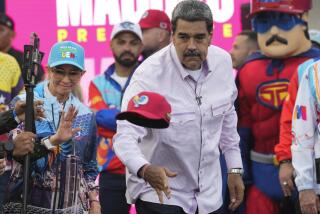U.S. Moves to Reshape Leadership of Contras : Greater Power for Moderate Elements Sought, Officials Say
WASHINGTON — The Reagan Administration, working feverishly behind the scenes to bolster its appeal for aid to the Nicaraguan rebels, is attempting to reshape the contras’ leadership to give more power to moderate elements, officials said Wednesday.
Senior State Department officials gradually have become convinced that the contras cannot succeed in replacing Nicaragua’s leftist regime--or win long-term support from Congress--unless they reform their political and military structure, aides said.
The main target of the officials’ dissatisfaction is the Nicaraguan Democratic Force, the largest contra army, whose leadership includes several former officers and civilian officials from the regime of the late dictator Anastasio Somoza.
May Be ‘Too Late’
“The contras are going nowhere unless basic changes are made,” one official involved with the program said.
“Some people think it’s too late, even if the changes are made,” he said, noting that the Administration has tried to broaden the contra leadership at least three times since 1981.
This time, through their control of the U.S. aid that is the contras’ main means of support, officials led by Assistant Secretary of State Elliott Abrams hope to revitalize the United Nicaraguan Opposition (UNO), the rebels’ political umbrella organization, aides said.
Abrams refused comment on the issue.
The Nicaraguan Democratic Force, led by Adolfo Calero and military commander Enrique Bermudez, has dominated the United Nicaraguan Opposition because of its overwhelming military weight. The organization, based in Honduras, has an estimated 18,000 troops; other contra groups, most of them based in Costa Rica, have perhaps 2,500.
But the Nicaraguan Democratic Force has long been criticized by other Nicaraguans, members of Congress, human rights groups and some Administration officials as dominated by a small group of wealthy exiles and unconvincing in its commitment to democracy.
State Department officials say they believe that more moderate contra leaders, including former Sandinista government officials Alfonso Robelo and Arturo Cruz, are better able to gain broad political support within Nicaragua and in Congress--and so should be given more power within the coalition.
‘New Balance of Forces’
“We’re not talking about replacing the leadership of UNO; we’re talking about a new balance of forces within UNO,” one senior official said.
Key members of Congress, including Senate Foreign Relations Committee Chairman Richard G. Lugar (R-Ind.), have been pressing for reforms in the contra leadership for months. They have noted that doubts about the commitment of the Nicaraguan Democratic Force to democracy undermines the rebels’ chances of winning the current battle for $100 million in U.S. aid.
“What Abrams is doing is fine,” a Lugar aide said. “The only problem is the White House hasn’t picked up on it and sold it yet.”
As part of the reform drive, the Administration has decided to fund a new United Nicaraguan Opposition representative office in Washington, headed by Carlos Ulbert, a Harvard-educated businessman close to Cruz. Until recently, the only functioning UNO office here was run by the Nicaraguan Democratic Force.
At the same time, Abrams is working to forge a new alliance between UNO and contra groups outside the coalition, including the small guerrilla army of former Sandinista hero Eden Pastora. Pastora, Calero and the other contra leaders are scheduled to sign a joint statement of objectives in Washington on Friday, ending four years of estrangement--at least on paper.
However, the moves will fall short of total unity. Pastora, who won renewed U.S. funding last week, is not joining the United Nicaraguan Opposition or accepting the umbrella group’s leadership, a spokesman said.
Nicaraguan Democratic Force officials, who have worked closely with the Administration since the CIA formed their organization in 1982, are upset by the moves. “We’re being stabbed in the back,” one complained.
Calero, striking a more diplomatic note, said he agrees with Abrams that “UNO does need to be projected more.” But he added: “You could say that we are being penalized for success.”
Several State Department officials said there have been “difficult” conversations with the leaders of the Nicaraguan Democratic Force in the last two weeks.
“It’s difficult to get those people to suddenly realize that the FDN leadership should be subservient to the UNO leadership, including people who were their enemies a few years ago,” one said. “It’s difficult to get them to accept that there’s new political leadership coming forward, too. It’s difficult, but it will happen.”
Others are more skeptical. The contras’ army grew out of several disorganized bands of rebels, many of them members of Somoza’s defeated National Guard who fled Nicaragua when the Sandinistas took power in 1979. After President Reagan secretly ordered the CIA to help organize the rebels in 1981, U.S. officials assembled a new political leadership for the Nicaraguan Democratic Force in 1982 and reorganized it in 1983. In 1985, still seeking broader political appeal, the State Department helped form the United Nicaraguan Opposition.
“The FDN still has the troops,” one official said.
Calero, brushing aside the mutterings of his aides, said that he too, is confident that the Nicaraguan Democrratic Force still will play the central role in the anti-Sandinista struggle.
“I’m not worried,” he ssaid over lunch at a French restaurant between meetings with members of Congress. “In the end, we’ll still be here.”
More to Read
Sign up for Essential California
The most important California stories and recommendations in your inbox every morning.
You may occasionally receive promotional content from the Los Angeles Times.











